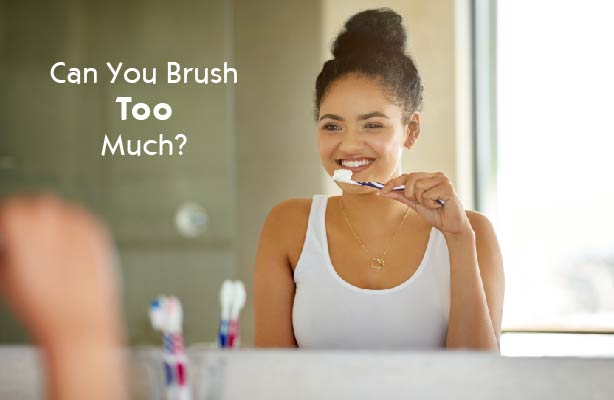Can You Brush Too Much?
May 30, 2017 1:00 pm
We all know the drill: brush our teeth twice a day for two minutes each time, and floss at least once a day. That’s the best way to ensure that our teeth stay healthy. But should we brush more than that? Can you brush your teeth too much? As it turns out, you just might be able to.
Too Much of a Good Thing
You might have heard the old adage that too much of a good thing can actually be bad. Phrases like that make their way into society because there’s some truth to them, and that’s even the case when it comes to brushing your teeth. There are a number of issues that too much brushing can cause.
- Thinning of enamel: Enamel is the hard, outer layer of our teeth that acts as a barrier against bacteria and acid. This helps protect teeth from decay. We’re actually born with all the enamel we’ll ever have, so it’s extra important to protect it from wear and tear. Vigorous brushing, using too much pressure, and, yes, brushing too much can all wear down your enamel and cause irreversible damage.
- Abrasion from your toothbrush: Toothbrush abrasion, or excessive wear on your gums and teeth, is a direct result of brushing too much and too hard. Abrasion causes tooth sensitivity because it exposes the more sensitive inner parts of the tooth and it leads to gum recession, which exposes the root area of the tooth. Tooth sensitivity often leads to the need for more dental work later on.
- Gum damage and disease: Our gums are very sensitive, so brushing them too much and too hard can lead to painful conditions. Like we already mentioned, it can cause gum recession, which leads to tooth sensitivity by exposing the root area. This also increases your chances of developing gum disease ranging from mild gingivitis to more severe periodontitis. It’s important to keep a close eye on your gums and let us know if you notice symptoms like bleeding when you brush or sores on your gums.
Brushing Tips
When you do brush, make sure you’re using the proper technique – short strokes going in a circular motion while holding the brush at a 45-degree angle to your gums. Don’t press too hard, either. If you notice the bristles are crumpled against your teeth, let up a bit until they’re straight. When it comes to the toothbrush you use, stick with a soft-bristled brush to avoid toothbrush abrasion. Remember: it’s not how hard you brush that determines how clean your teeth are; it’s how thorough you are with your brushing.
Want to learn more about how to properly brush your teeth? Ask Dr. Linkous and our team at your next preventive appointment. You can schedule online or call our office. We’ll set you up with a convenient time!
Contact Us TodayCategorised in: General Dental